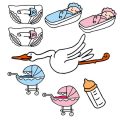1. Schedule Your First Prenatal Appointment
Why Early Prenatal Care Matters
As soon as you find out you’re pregnant, one of the most important things to do is schedule your first prenatal appointment. Early visits with a healthcare provider help make sure you and your baby start off on the right foot. Seeing an OB-GYN or a certified midwife early in your pregnancy can help spot any potential issues, answer your questions, and give you peace of mind as you begin this exciting journey.
What to Expect at Your First Visit
Your first prenatal appointment is usually scheduled around 8 weeks after your last period, but it’s okay to call and set it up as soon as you get a positive pregnancy test. Here’s what typically happens during this visit:
| What Happens | Why It’s Important |
|---|---|
| Medical History Review | Your provider will ask about your health, family history, and any medications you’re taking to understand your needs. |
| Physical Exam & Vital Signs | Checking blood pressure, weight, and overall health to create a baseline for your pregnancy. |
| Lab Tests & Screenings | Blood work and urine tests check for anemia, infections, and other conditions. |
| Prenatal Vitamins Discussion | Your provider will recommend vitamins like folic acid for healthy fetal development. |
| Estimated Due Date Calculation | The doctor or midwife will estimate when your baby is due based on your last menstrual period. |
| Questions & Answers | You’ll have time to ask about symptoms, diet, exercise, and anything else on your mind. |
Tips for Choosing the Right Healthcare Provider
Selecting the right OB-GYN or midwife is a big decision. Here are some tips to help you find someone who fits your needs:
- Ask for Recommendations: Friends, family members, or your primary care doctor can suggest providers they trust.
- Check Your Insurance: Make sure the provider accepts your insurance plan to avoid unexpected bills.
- Consider Location: Choose an office that’s convenient for appointments and emergencies.
- Research Credentials: Look into their experience with pregnancy care and read reviews from other patients.
- Trust Your Gut: After meeting a provider, consider whether you feel comfortable and supported—your comfort matters!
2. Start Taking Prenatal Vitamins
Why Prenatal Vitamins Matter
Prenatal vitamins are specially formulated to support your health and your baby’s development during pregnancy. Even if you eat a healthy diet, getting enough of certain nutrients—like folic acid, iron, and calcium—can be challenging through food alone. Taking prenatal vitamins helps fill these nutritional gaps, ensuring your baby gets the essential nutrients needed for proper growth, especially in the first trimester when major organs are forming.
Key Vitamins and Minerals for Pregnancy
| Nutrient | Why Its Important | Recommended Daily Amount* |
|---|---|---|
| Folic Acid (Vitamin B9) | Helps prevent neural tube defects in the brain and spine | 400-800 mcg |
| Iron | Supports increased blood volume and prevents anemia | 27 mg |
| Calcium | Builds strong bones and teeth for baby; supports mother’s bone health | 1,000 mg |
| Vitamin D | Aids calcium absorption and supports immune function | 600 IU (15 mcg) |
| DHA (Omega-3 fatty acid) | Supports brain and eye development | 200-300 mg |
| Iodine | Essential for thyroid function and baby’s brain development | 220 mcg |
| Vitamin B6/B12 | Supports energy levels and reduces nausea | B6: 1.9 mg; B12: 2.6 mcg |
| *Always consult with your healthcare provider about the right dosage for you. | ||
How to Choose the Right Prenatal Vitamin
- Look for Key Ingredients: Make sure the vitamin contains folic acid, iron, calcium, vitamin D, iodine, and DHA.
- No Artificial Additives: Choose products without unnecessary fillers or artificial colors.
- Your Doctor Knows Best: Ask your OB-GYN or midwife for recommendations tailored to your needs.
Tips for Incorporating Prenatal Vitamins into Your Routine
- Take Them Daily: Set a reminder on your phone so you don’t forget.
- Avoid Taking on an Empty Stomach: Some vitamins can cause nausea if taken without food. Try taking them after a meal or snack.
- If You Have Trouble Swallowing Pills: Look for chewable or gummy prenatal vitamins, but check that they still have all essential nutrients.
Your Next Step: Talk to Your Healthcare Provider
Your doctor can help you choose the best prenatal supplement based on your health history, dietary needs, and any allergies or sensitivities you may have. Starting prenatal vitamins early in your first trimester—or even before conception—is one of the best things you can do for your baby’s health.

3. Review Your Lifestyle Habits
Making Healthy Choices in the First Trimester
Your daily habits play a huge role in your babys development during the first trimester. Now is the perfect time to take a closer look at what you eat, how you move, and how well you rest. Simple changes can make a big difference for both you and your baby.
Eat Smart: What to Include and Avoid
| Foods to Enjoy | Foods to Avoid |
|---|---|
| Whole grains (oatmeal, brown rice) | Raw or undercooked meat and eggs |
| Fresh fruits and vegetables | Unpasteurized dairy products |
| Lean proteins (chicken, fish, beans) | Deli meats unless heated until steaming |
| Dairy products (milk, cheese, yogurt) | Certain fish high in mercury (shark, swordfish) |
| Nuts and seeds | Caffeine (limit to 200 mg per day, about one 12 oz coffee) |
Tip:
Stay hydrated by drinking plenty of water throughout the day. Try to avoid sugary drinks and limit caffeine intake.
Staying Active Safely
Regular exercise can help ease common pregnancy symptoms like fatigue and back pain. Most women can continue their usual activities, but always check with your healthcare provider first. Great options include:
- Walking around your neighborhood or local park
- Prenatal yoga classes (many are available online!)
- Swimming or water aerobics if you have access to a pool
- Light stretching at home
Aim for about 30 minutes of moderate activity most days of the week. Listen to your body—if you feel tired, it’s okay to rest!
Getting Enough Rest
You may notice you’re more tired than usual during the first trimester. That’s totally normal! Focus on building good sleep habits now:
- Try to go to bed and wake up at the same time every day.
- Create a relaxing bedtime routine—reading or listening to soft music can help.
- Avoid screens (phones, TVs) at least an hour before bed.
- If you struggle with nausea at night, keep some crackers or dry cereal by your bed.
4. Educate Yourself on Early Pregnancy Symptoms
Recognizing Common First Trimester Symptoms
Every pregnancy is unique, but there are some common symptoms that many women experience in the first trimester. Learning what’s normal can help you feel more confident and prepared as your body goes through these changes. Here’s a quick look at some typical early pregnancy symptoms and what you can do to manage them:
| Symptom | Description | Tips for Relief |
|---|---|---|
| Morning Sickness | Nausea or vomiting, often worse in the morning but can happen any time of day. | Eat small, frequent meals; keep crackers by your bed; stay hydrated; try ginger tea or candies. |
| Fatigue | Feeling unusually tired, even with enough sleep. | Take short naps if needed; prioritize rest; don’t hesitate to ask for help with chores. |
| Frequent Urination | Needing to pee more often due to hormonal changes and increased blood flow. | Stay hydrated but avoid too much fluid before bedtime; use bathroom breaks as needed. |
| Breast Changes | Tenderness, swelling, or darkening of the nipples. | Wear a supportive bra; use gentle moisturizers if needed. |
| Mood Swings | Emotional ups and downs caused by hormones. | Talk to loved ones about how you’re feeling; practice self-care like walks or relaxation techniques. |
When to Call Your Healthcare Provider
While most early pregnancy symptoms are normal, there are times when it’s important to reach out to your healthcare provider. If you notice any of the following, give your doctor or midwife a call:
- Heavy bleeding or severe abdominal pain
- Painful urination or signs of infection (like fever)
- Dizziness that doesn’t go away
- Persistent vomiting that makes it hard to keep fluids down
- Severe headaches or vision changes
Your Next Steps
The first trimester can be an exciting and overwhelming time. Remember, understanding your symptoms and knowing when to seek help is a big part of taking care of yourself and your growing baby. If you ever feel unsure about what you’re experiencing, don’t hesitate to contact your healthcare team—they’re there to support you every step of the way!
5. Update Healthcare and Insurance Information
Check Your Maternity Coverage
One of the first things you should do in your first trimester is to make sure your health insurance covers maternity care. This will help you avoid surprise bills and make it easier to plan for doctor visits, tests, and your hospital stay. Contact your insurance provider or check their website for details about prenatal visits, ultrasounds, lab work, delivery costs, and newborn care.
Key Questions to Ask Your Insurance Provider
| Question | Why It Matters |
|---|---|
| Is maternity care fully covered? | To know what out-of-pocket costs you may have for prenatal and delivery care. |
| Are specific hospitals or doctors required? | To ensure your chosen provider is in-network, which can save you money. |
| What are my co-pays and deductibles? | To budget for each appointment or service. |
| Is there coverage for prenatal screenings and ultrasounds? | To make sure all recommended tests are included. |
| How do I add my baby to the policy after birth? | So your newborn is covered right from day one. |
Understand Your Benefits Package
If you have employer-provided insurance, talk to your HR department about parental leave options and any additional pregnancy-related benefits, like lactation support or prenatal classes. Many companies offer resources that can help reduce stress during pregnancy.
Organize Important Paperwork
Start a folder (digital or paper) for all pregnancy-related documents. This should include:
- Your insurance card and policy info
- Contact information for your OB-GYN or midwife
- A calendar of upcoming appointments
- Bills and receipts related to medical expenses (these can help with FSA/HSA reimbursements)
- Prenatal test results and records from your healthcare provider
Tips for Staying Organized
- Set reminders in your phone for appointments and paperwork deadlines.
- Create a checklist of tasks like notifying insurance of your pregnancy or adding your baby to your policy after delivery.
- If using an HSA or FSA, keep track of eligible expenses as you go.
Taking these steps early helps set the stage for a smoother, less stressful pregnancy journey by making sure you’re prepared both medically and financially.


